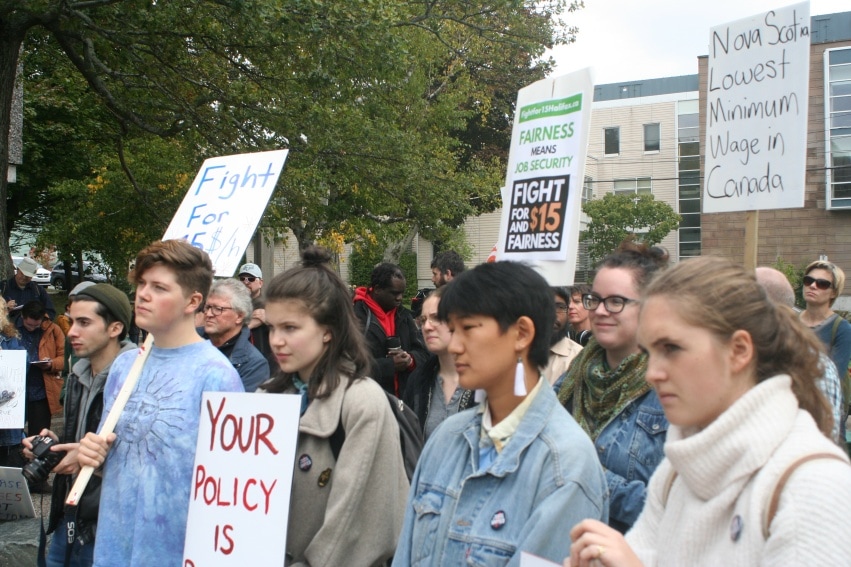
KJIPUKTUK (Halifax) – The sky isn’t going to fall, but that’s what you’d think if you listen to the right-wingers’ sound bites on a higher minimum wage in Nova Scotia, or in fact anywhere.
There is more and more data to show that businesses aren’t closing, job losses don’t happen, and in fact, the economy picks up in areas where a higher minimum wage has been implemented.
A higher minimum wage will help some 26,000 workers in Nova Scotia. As we continue our fight for a higher minimum wage, we also must make improvements to Labour Standards, improvements that will help workers, to ensure that part-time, temporary, casual and contract workers receive the same pay and benefits as their full-time, permanent counterparts.
We need laws that promote full-time, continuous work with adequate hours for all those who choose it and better laws on worker scheduling with proper notice and to ensure workers get at least seven days of paid sick time annually.
We need laws to stop employers from downloading their responsibilities for minimum standards onto temporary agencies, subcontractors or workers themselves and of course end the practice of contract flipping, and support wage protection and job security for workers when companies change ownership or contracts expire.
We also need better laws that will extend minimum protections to all workers by eliminating exemptions for some workers and make sure we have proactive enforcement of the laws through adequate public staffing and meaningful penalties for employers who violate the rules. And we need laws to ensure employers cannot skirt the law by taking a worker’s tips or making workers pay for uniforms or other work-related tools or clothing.
So, here are a few reasons why we support a higher minimum wage. You should ignore the whining from the right-wingers and get on with the job of making sure our lowest-paid workers get a decent raise.
Don’t buy that a higher minimum wage kills jobs, it doesn’t.
Statistics Canada data tells us that after recent increases in minimum wage in some other provinces, the economy picked up and job loss just didn’t happen. Many experts have been studying the effects of minimum wage increases for more than 30 years, and the massive job losses predicted by the hypothetical economic models used by business groups have never materialized in the real world. The bottom line is that in provinces like Ontario and Alberta and in American cities like Seattle, San Francisco and Santa Fe, absolutely none of the dire predictions have come true.
A higher minimum wage actually helps the economy. There are two reasons why the sky doesn’t fall when we see increases to the minimum wage.
First, higher salaries can actually help control business costs by reducing employee turnover, which, in turn, increases productivity. This has been referred to as the “Costco Effect,” after the company learned it can profit in the cut-throat retail sector by paying its employees more.
Second, higher wages put more money in the pockets of low-wage workers who, in turn, spend that money in the local economy. This is referred to as the “Henry Ford Effect,” after the famous U.S. industrialist who paid his employees well, so they could afford to buy his cars.
Higher minimum wages don’t hurt profits. The reason some economic models predict massive job losses resulting from minimum wage increases is because those models assume businesses will do nothing to deal with the changed environment, which, of course, is ridiculous.
What happens in the real world, is that increased costs are merely passed along to customers in the form of slightly higher prices. So, a higher minimum wage is much more likely to result in a cup of coffee that costs 15 cents more than it is to result in layoffs.
The beauty of an across-the-board increase is that it levels the playing field.
Employers who have always wanted to pay their workers fairly will no longer have to worry about being undercut by unscrupulous competitors who pay poverty wages.
One of the main complaints of low-wage defenders is that single jump in the minimum wage hurts business. The problem with this argument is that it’s wrong. Ontario raised its minimum wage by 65 percent over a shorter period in the 1970s, and the sky didn’t fall. The same is true for many U.S. cities more recently, and the same holds true in Nova Scotia back some years ago.
When setting the minimum wage, our starting point should be our values. Specifically, we should have a minimum that allows a person working full-time, full year, to live above the poverty line. Our current minimum wage doesn’t even come close to that threshold.
It’s also time to act on evidence from groups like the International Monetary Fund (hardly a radical outfit) showing that low wages actually suppress economic growth.
What all this means is we shouldn’t be afraid of a higher minimum wage. The minimum salary, like wages for many workers, hasn’t kept up with inflation and that, my friends, must change. It’s positively viewed as OK when corporate CEO’s can get massive increases in their pay packets, those are the kind of raises we all deserve.
After all, it the workers’ sweat and tears that make the business and corporation profit wheels turn.
With thanks to the Alberta Federation of Labour, whose 2015 letter inspired this editorial.
Danny Cavanagh is president of the Nova Scotia Federation of Labour
With a special thanks to our generous donors who make publication of the Nova Scotia Advocate possible.
Subscribe to the Nova Scotia Advocate weekly digest and never miss an article again.



